Rajapaksa not only needs to go, he needs to face accountability
Protesters want a new Sri Lanka, not just a reshuffling of the stale old card
By Paikiasothy Saravanamuttu
Last week, a new prime minister of Sri Lanka was sworn in. Ranil Wickremesinghe, from the minority opposition United National Party (UNP), has held the post several times in his four-decade-long political career.
Amid widespread protests resulting from the island’s gravest economic crisis since independence, Parliament clearly thinks this is a figure to steady the ship. But without acquiescing to the protesters’ key and repeated demand – for the discredited President Gotabaya Rajapaksa to step down – this is merely rearranging deckchairs on the Titanic.
Colombo is a tinder box. The country appears to be bankrupt, facing acute shortages and a brewing humanitarian crisis. Spontaneous protests can form at any minute simply because much of life involves queueing up for basic items. Millions take to the streets in increasingly common general strikes that grind the nation to a halt. The people put the blame for Sri Lanka’s worst economic crisis in 70 years squarely on the bumbling and sinister rule of President Rajapaksa. For months, their demands for his resignation have fallen on deaf ears, and inevitably the impasse has become deadly.
The resignation of his brother Prime Minister Mahinda Rajapaksa last Monday (9) has done little to placate the demonstrators. If anything, the way he eventually departed exhibited the kind of behaviour that has led us to this crisis; intransigently dismissing months of protests calling for his exit, the Trumpian rallying of his supporters outside his official residence and eventually fleeing to a military base on the other end of the island. A court has now banned him from leaving the country. He says he left to seek to build a unity government but on his way out, he sowed terrible discord.
Though the former PM may not have directly called for violence, his associates quickly bussed in angry mobs, made inflammatory speeches and gave them a nod to violently dismantle the peaceful protesters’ tented encampment and indiscriminately attack them with iron bars. The opposition groups then furiously retaliated, overturning buses and torching the properties of pro-regime politicians. Nine were killed and more than 200 injured. The following days have been more peaceful, but only due to a rolling nationwide curfew and orders for troops to shoot looters and rioters on sight.
The astronomical price rises of food, fuel and pharmaceuticals have brought people to their wits’ end. Sri Lanka is now reduced to knocking on the world’s door with a begging bowl but even that process has been disrupted. Government officials are due to meet with the International Monetary Fund (IMF) to discuss emergency financing. The country is down to its last $50m of foreign reserves. Urgent help is needed, but not at any cost.
Our IMF interlocutors must know that Sri Lankans’ seething anger will not be quelled by the quick appointment of a prime minister from a party that holds one seat in Parliament while the president that presided over the mess is untouchable. A respected, credible leader is required to shepherd the country through the inevitable stringent financial sacrifices otherwise the people will not tolerate it.
Rajapaksa must go. All other paths lead to more instability and violence, and yet another chance for change will have been squandered. Three other ministers with the surname Rajapaksa have already resigned in the last month, merely reminding protesters that they have been governed by a corrupt clan for far too long and there must be none left in power.
The protesters – who enjoy widespread support – do not simply want the president to step down; they are calling for accountability and justice for his mismanagement, corruption and human rights abuses that have persisted for decades. They want a new Sri Lanka, not just a reshuffling of the stale old cards. But such a fundamental reshaping of politics cannot be done with the old guard still in place. Politicians should be wary of even entertaining the idea of immunity for Rajapaksa; the people will see it rightly as a betrayal.
The longer Rajapaksa stays in power, the longer the delays in negotiating an IMF bailout and the more people will starve. The more people starve, the more their demonstrations will continue unabated. The more unrest, the higher the risk that Rajapaksa may resort to more violence. But the regime cannot necessarily guarantee that the police and army will follow orders to suppress this movement, after all the families of an average soldier and policeman are suffering the same economic deprivations too. Cracks are appearing in the fortress. We can only hope that the inevitable collapse does not crush us all.
-Paikiasothy Saravanamuttu is the founder Executive Director of the Centre for Policy Alternatives (CPA) and this article was originally featured on aljazeera.com


